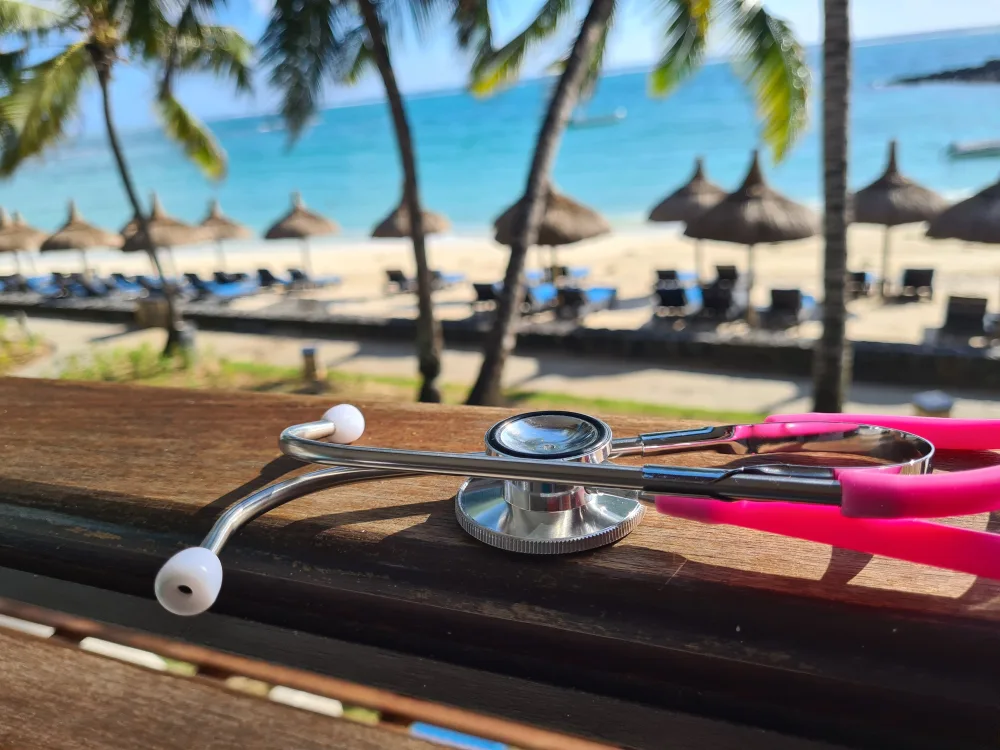How does travel insurance actually work during emergencies?

How does travel insurance actually work during emergencies?
Let’s be honest – when you’re buying travel insurance before a trip, you’re probably not imagining worst-case scenarios. But if something does go wrong abroad, knowing how your travel insurance works can be the difference between calm and chaos.
We believe in making things clear. We’re here to demystify the process and explain exactly what happens when you need help, so you can travel knowing there’s real support behind you. Whether it's a medical emergency in Malaga or a missed connection in Munich, here’s what you need to know.
What counts as an emergency abroad?
“Emergency” is a word we all understand instinctively. But in the context of travel insurance, it has a specific meaning – one that directly affects whether you’re entitled to immediate help and cover.
In simple terms, an emergency is:
A sudden, serious, and unforeseen situation that poses a risk to your health, safety, or ability to continue your trip.
It’s something you couldn’t reasonably plan for, that requires urgent action, whether it’s medical care, logistical help, or travel disruption.
Examples of genuine travel emergencies
- A medical collapse or injury: You suffer chest pain while on a walking tour in Lisbon. You're rushed to the hospital and diagnosed with a cardiac issue. This is a medical emergency. Your travel insurance would step in immediately, organising care, guaranteeing payment, and liaising with your doctors back home if needed.
- A serious accident or fall: You slip on uneven cobblestones in Florence and break your hip. You need surgery and can’t travel home alone. Your insurer would coordinate surgery, cover the hospital stay, and arrange medical repatriation.
- A lost passport hours before your flight: You discover your passport has been stolen from your hotel in Barcelona. Without it, you can’t board your return flight. This counts as a non-medical emergency, and your insurer can help with emergency documentation and rearranged travel.
Call the emergency helpline
If you're in a medical emergency abroad, your first action should be to contact your travel insurer's emergency assistance line.
Why is this step so critical? Most insurers – JustCover included – have dedicated 24/7 emergency helplines staffed by trained case managers. These teams are experienced in handling crises involving travellers abroad. Many speak multiple languages. They know the hospital systems, they know what steps to take, and they act fast.
Here’s what happens when you call:
- You're connected to a trained professional – not a chatbot or automated message.
- They assess the urgency of the situation.
- They tell you where to go (or send an ambulance if needed).
- They liaise with medical staff, often before you even arrive at the hospital.
- They begin the process of authorising care and arranging payment.
If you're in a serious situation and can't call yourself (for example, you’re unconscious or being treated on-site), someone else can call on your behalf – whether that’s a family member, hotel manager, or doctor.
Important: If you receive treatment before contacting your insurer (unless it’s life-threatening), you may need to pay up front and claim later. Always call first where possible.
The emergency assistance team jumps into action
Once you’ve made the call, the emergency assistance team takes over the heavy lifting. Their job is to make sure you get the care you need, without delay, confusion, or unexpected bills.
Their job is to:
- Confirm what’s medically necessary with doctors.
- Contact the hospital directly, so you’re not handed a bill on arrival.
- Arrange payment guarantees, meaning you won’t need to pay upfront (unless in rare exceptions).
- Notify your family back in Ireland, if you want them to be kept updated.
- Arrange interpretation services if there are language barriers.
The assistance team’s goal is to get you treated quickly and safely, without adding unnecessary stress or bureaucracy. And for most JustCover customers, this is the point where anxiety starts to lift: the moment someone else takes over and starts solving the problem.
Our role is as much emotional as it is practical. When you’re in shock or pain, having someone say “We’ve got this” and actually mean it makes all the difference.
Medical costs abroad
Here’s what most people worry about: ending up in a hospital bed in a foreign country with no idea what care costs, whether you’re allowed to stay, or who’s paying the bill.
With comprehensive travel insurance, this is what you’re covered for:
- Emergency hospital admission – including tests, scans, and overnight stays
- Outpatient treatment – urgent blood tests, CT or MRI scans
- Surgery – if medically required, and arranged by the treating team
- Ambulance costs – whether public or private transport is used
- Prescribed medications – both in-hospital and when discharged
- Medical equipment – including oxygen, crutches, mobility aids
- Follow-up care – if required while still abroad
The assistance team works with local hospitals to approve every stage of your care. Most insurers have relationships with hospital networks in popular destinations (Spain, Portugal, France, Greece, etc.), so there’s no confusion about who’s paying.
Remember, EHICs aren’t enough because they only cover emergency state care in EU countries and do not:
- Guarantee access to private hospitals
- Cover repatriation to Ireland
- Cover non-medical issues like lost passports or trip cancellations
Declare your pre-existing medical conditions before you travel
If you have a pre-existing medical condition, your insurer must know about it in advance. That means declaring things like diabetes, high blood pressure, cancer, asthma, or heart issues during your quote. If you didn’t declare them, your claim could be denied – even if unrelated.
What happens if you need emergency medical evacuation and repatriation?
Sometimes, the best treatment option is to return home for specialist care. That’s where medical evacuation or repatriation comes in.
This might involve:
- A medical escort accompanying you on a commercial flight
- A private air ambulance
- Ground transport on both ends (ambulance from your hotel and from the airport in Ireland)
- Booking medical clearance with your GP and local specialists
- Informing family and setting expectations
These are complex logistics that would be overwhelming to handle yourself, but insurers deal with them daily. It’s essential that your travel insurance policy includes this cover. Most JustCover policies include unlimited medical evacuation if medically necessary.
You don’t need to organise anything. Your insurer handles everything, from the hospital abroad, through the flight, to the final hospital drop-off in Ireland. This is one of the most valuable aspects of travel insurance.

What happens in the event of a non-medical emergency?
Not every emergency is medical, but that doesn’t make it any less stressful.
Imagine you're at a busy train station in Rome. Your bag is stolen along with your passport, wallet, and hotel keys. Or perhaps your connecting flight home is cancelled due to a strike, and you’re left overnight in a foreign airport without accommodation.
Here’s how your insurer can help in non-medical emergencies:
- Lost or stolen passport: The emergency team can direct you to the nearest Irish embassy, help you book emergency appointments, and cover additional travel costs caused by delays.
- Travel disruption: If a strike, storm, or accident delays your transport, your policy may cover hotel stays, food, or alternative flights.
- Stolen baggage or valuables: You’ll be advised how to file a police report (usually required for claims) and may be reimbursed for stolen or damaged items.
Not every mishap is dramatic, but even small incidents can become expensive and distressing without the right support.
Be prepared, not panicked
Travel insurance isn’t just a safety net. It’s the plan that kicks in when your own plans fall apart. Emergencies abroad are stressful enough. The last thing you need is doubt about who will help, how it works, or what’s covered.
So before you head off, give your future self the peace of knowing this: if something goes wrong, someone’s got your back and knows exactly what to do.
Get a quick travel insurance quote
Affordable travel insurance for all your needs
Discover the World
Stay up to date with the latest travel tips and advice

Ireland’s best cities for fireside cosiness this winter

Age is no barrier: over-55s embrace adventure holidays
